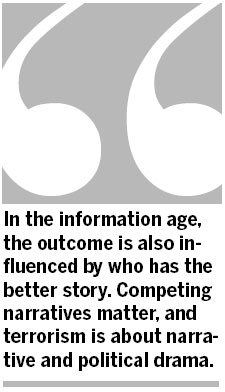
'Privatization of war' means hard military power needs to be accompanied by the effective use of ideas and legitimacy
Al-Qaida's attack on the United States 10 years ago came as a profound shock to the US and the world. What lessons can we learn a decade later?
Anyone who flies to the US or tries to visit a Washington office building gets a reminder of how US security was changed by Sept 11, 2001. But, while concern about terrorism is greater, and immigration restrictions are tighter, the hysteria that followed in the early days after the 9/11 attacks has abated. New agencies such as the Department of Homeland Security, the Director of National Intelligence, and an upgraded Counter Terrorism Center have not transformed the US government, and, for most US citizens, personal freedoms have been little affected. No more large-scale attacks have occurred inside the US, and everyday life has continued much as it did before 9/11.
But this apparent return to normality should not mislead us about the long-term importance of 9/11. As I argue in my book The Future of Power, one of the great power shifts of this global information age is the strengthening of non-state actors. Al-Qaida killed more US citizens on Sept 11, 2001 than the attack by Japanese government forces on Pearl Harbor in 1941. This might be called the "privatization of war."
During the Cold War, the US had been even more vulnerable, in technological terms, to a nuclear attack from Russia, but "mutual assured destruction" prevented the worst from happening by keeping vulnerability more or less symmetrical.
Two asymmetries, however, favored Al-Qaida in September 2001. First, there was an asymmetry of information. The terrorists had good information about their targets, while the US before Sept 11 had poor information about the identity and location of terrorist networks. Some government reports had anticipated the extent to which non-state actors could hurt large states, but their conclusions were not incorporated into official plans.
Second, there was an asymmetry in attention. A larger actor's many interests and objectives often dilute its attention on a smaller actor, which, by contrast, can focus its attention and will more easily. There was a good deal of information about Al-Qaida in the US intelligence system, but the US was unable to coherently process the information that its various agencies had gathered.
But asymmetries of information and attention do not confer a permanent advantage on the wielders of informal violence. There is no such thing as perfect safety, and, historically, waves of terrorism have often taken a generation to recede. Even so, the elimination of top Al-Qaida leaders, the strengthening of US intelligence, tighter border controls, and greater cooperation between the FBI and the CIA have all made the US safer.
But there are larger lessons that 9/11 teaches us about the role of narrative and soft power in the information age. In the information age, the outcome is also influenced by who has the better story. Competing narratives matter, and terrorism is about narrative and political drama.
The smaller actor cannot compete with the larger in terms of military might, but it can use violence to set the world agenda and construct narratives that affect its targets' soft power. Osama bin Laden was very adept at narrative. He was not able to do as much damage to the US as he hoped, but he managed to dominate the world agenda for a decade, and the ineptness of the initial US reaction meant that he could impose large costs on the US.
Former president George W. Bush made a tactical error in declaring a "global war on terrorism." He would have done better to frame the response as a reply to Al-Qaida, which had declared war on the US. The global war on terror was misinterpreted to justify a wide variety of actions, including the misguided and expensive Iraq War, which damaged the US image. Moreover, many Muslims misread the term as an attack on Islam, which was not the US' intent, but suited bin Laden's efforts to tarnish perceptions of the US in key Muslim countries.
To the extent that the trillion of dollars of unfunded war costs contributed to the budget deficit that plagues the US today, bin Laden was able to damage American hard power. And the real price of 9/11 may be the opportunity costs: For most of the first decade of this century, as the world economy gradually shifted its center of gravity toward Asia, the US was preoccupied with a mistaken war of choice in the Middle East.
A key lesson of 9/11 is that hard military power is essential in countering terrorism, but that the soft power of ideas and legitimacy is essential for winning the hearts and minds of the mainstream Muslim populations from whom Al-Qaida would like to recruit. A "smart power" strategy does not ignore the tools of soft power.
But, at least for the US, perhaps the most important lesson of 9/11 is that US foreign policy should follow the counsel of former president Dwight Eisenhower a half-century ago: Do not get involved in land wars of occupation, and focus on maintaining the strength of the American economy.
The author, former US assistant secretary of defense, is a professor at Harvard. Project syndicate.
(China Daily 09/05/2011 page8)